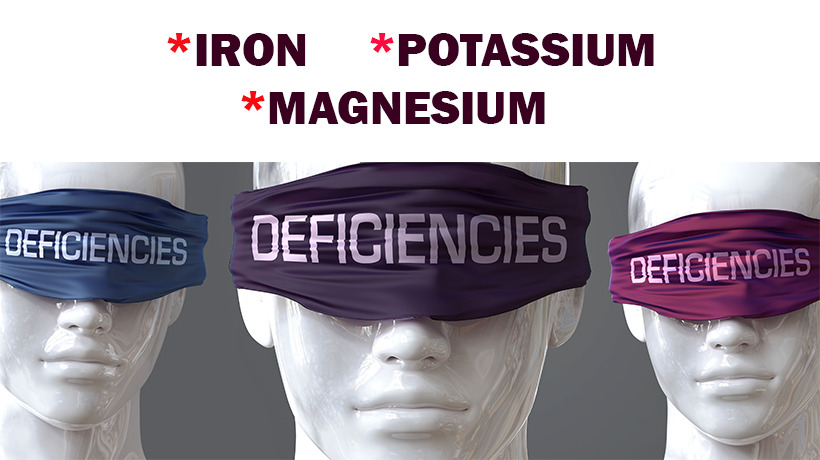With as much information out there about what you should be eating, figuring out a balanced diet can be overwhelming. And it’s true: aiming for a variety of foods with vitamins, minerals and macronutrients like protein offers the best chance to feel healthy.
But starting with the most common mineral deficiencies may help put you in the right direction to finding a diet that makes you feel your best. That’s why we’ve gathered information about three of the most common minerals people lack. Here are 10 quick facts you need to know about iron, magnesium and potassium.
Why do you need iron?
The University of Michigan Health System says iron is one of the parts of hemoglobin, the substance in red blood cells that helps blood carry oxygen throughout the body; without enough oxygen in the body, you could feel fatigued. And if you lack iron and aren’t producing enough hemoglobin in your blood, you could be at risk for anemia.
Why do you need magnesium?
Harvard Health Publishing says magnesium is involved in more than 300 chemical reactions in the body. Magnesium helps muscles to contract, nerves to send and receive messages, your heart to beat steadily and your immune system to be strong. Periodic Paralysis International, a nonprofit medical resource site from Alberta, Canada, says magnesium helps maintain potassium.
Why do you need potassium?
Potassium regulates blood pressure and helps your muscles move, your kidneys filter blood, and your nerves to work, according to WebMD.
What causes an iron deficiency?
Iron usually lowers during blood loss, according to the University of Michigan. In women, this happens during monthly periods. Blood loss could also be caused by ulcers, some cancers, and other health problems. You might not have lost blood, but you might need more than usual if you’re pregnant, for example. A lack of iron in your diet may also be the cause of an iron deficiency.
What causes a magnesium deficiency?
Low magnesium intake is the most common cause, according to the study “Magnesium Metabolism and Its Disorders” in the journal Clinical Biochemist Reviews. Kidney failure or gastrointestinal problems are other potential causes, but they’re much less likely.
What causes a potassium deficiency?
According to Mayo Clinic, diuretic medications may make you lose potassium in your urine. Vomiting, diarrhea and excessive alcohol use may also be immediate causes. And again, a low-potassium diet could be the culprit.
What are the symptoms of iron deficiency?
Fatigue, problems breathing, dizziness, headache, and feeling abnormally cold, according to the University of Michigan.
What are the symptoms of magnesium deficiency?
Nausea, weakness, and vomiting, according to Healthline. As the deficiency worsens, symptoms might include numbness, tingling, muscle cramps, seizures, and abnormal heart rhythms.
What are the symptoms of potassium deficiency?
According to Periodic Paralysis International, fatigue is the most common symptom. A more severe deficiency could result in insomnia, slow or irregular heartbeat, and gastrointestinal problems, as well as impaired glucose metabolism that could lead to elevated blood sugar.
What can I eat that has these nutrients?
Spinach, kidney beans, almonds, broccoli, potatoes, pumpkins, avocados, tuna, and fortified cereals are just a few foods that have all three of these nutrients in them. Many foods contain one or two of these nutrients, so experimenting with a variety of ingredients can help you find a balance to your diet.
Sources:
http://www.med.umich.edu/cancer/files/why-is-iron-important.pdf
https://www.webmd.com/vitamins-and-supplements/features/iron-supplements#1
https://www.health.harvard.edu/staying-healthy/what-you-should-know-about-magnesium2
https://hkpp.org/patients/potassium-health
https://www.healthline.com/nutrition/7-common-nutrient-deficiencies
https://www.webmd.com/heart-disease/potassium-and-your-heart
https://www.ncbi.nlm.nih.gov/pmc/articles/PMC1855626/
https://www.mayoclinic.org/symptoms/low-potassium/basics/causes/sym-20050632
https://www.healthline.com/health/hypomagnesemia#symptoms
https://www.webmd.com/diet/foods-rich-in-potassium#1



